#NATIONAL BACHELORS ASSOCIATION
Text
LOMBARDI SOCIETY ORGANIZATIONOPSYS - TERRY I
TO WHOM IT CONCERNS THE NFL NATIONAL FOOTBALL LEAGUE
LOMBARDI SOCIETY IS A OFFSPRING SECT OF THE LOMBARDI PARTY A SEPERATE PIECE OF WRITTING LOMBARDI SOCIETY IS AN INTELLIGENT LEAGUE OF ADULT INDIVIDUAL FOUNDED AND FUNDED ON OUR EXISTENCE AMONG OUR ON AND OFF OR PROFESSIONAL OR NO PROFESSIONAL MERITT BE IT ON OR OFF THE FIELD OR IN THE FIELD OR DRAWN OUT OF THE FIELD WITH SUCCESS AND ACOMPLISHMENT AND AN ADULT LEAGUE SOCIETY DEMEANOR What is a person's demeanor ? Demeanor definition
Your demeanor is your outward behavior. It includes the way you stand, the way you talk, your facial expressions, and more . OUR ADULT LEAGUE SOCIETY VALUE AND PRINICIPLE GUIDE OURS THROUGH OUR VICTORIES AND NEVER SOUR OR MORALITY AND EVEN SO GIUDE THROUGH OUR MORE BITTER SOUR VICTORIES WITH SOUR CANDY BITTER SWEETNESS OUR POSITIVE HABITS OR MORALS PRINICIPLE AND HEART WE WEAR ON OUR SLEEVES LIKE BODY LANGAUGE THAT SHOWS OUR GOALS BE OUR LIMITATIONS OUR OBJECTIVES BE OUR BEYONG OUR GOALS OUR OBLIGATIONS BE JUSTFUL AS OUR RESPECT AND RESPONSIBILITY IS WITHOUT QUESTIONABLE ADORATION , LEADING EACH OF OURS TO OVERACHIEVEMENT CORE AND UNDERACHIEVEMENT LOW LEVEL OF ATTITUDE AND OR PERFORMANCE the action or process of carrying out or accomplishing an action, task, or function. TO ALL A TIME HIGHS BE IT A HIGH BALANCED IQ & IVY LEAGUE STYLE AND COLLEGIATE PROFESSIONAL UNITY GIFTED EACH WITH LIMITLESS POTENTIALITY AND THAT IS THE CERTAIN REALITY WITH IN CONSIDERATION OUR AWARDS FOR OUTSTANDING ACHIEVEMENT PARTICIPATION THOSE HONOR AWARDS , COLLEGE AND PROFESSIONAL OR ACADEMIC AWARDS academic award means an award conferred by an institution of tertiary education in recognition of achievement in a course conducted by the institution: Sample 1. academic award means a degree, diploma, certificate and other certification of academic achievement awarded by the College; Scholastic Award Your scholastic achievement or ability is your academic achievement or ability while you are at school . FOR THOSE ONLINE OR ONLINE AND OFFLINE EDUCATIONAL STUDENTS IN THE NFL WHO CONISDERED BEYOND FOOTBALL , ALSO THOSE WHO TAKE THE LOMBARD STREET WALK UNTIL YOUR WALKING ON LOMBARDI STREET AND ALCOHOLIC FUELS LIKE BARCARDI MAYBE A CAR A WAR A CARD AND AWARD AND SURE IN IT FOR LOMBARDI PARTY AND THE BAR EXAM IS ROUGHLY TRANSLATED 5 24 AM ANTE MERIDIEM AS X CHROMOSOME FOUND IN MALES AND FEMALES A LIKE AND F IS SIX OR FEMALE SEX AND CHROMOSOME XX IS NOT A MALE BUT LIKELY TWO STRIKES OUT IF MAN RUN WAS A HOME RUN FOR HOMER AND BASEBALL NOTED CONSIDERATION OF MILITARY BASES AND PRONUNCIATION LIKE TERRY OR MILITARY AS MANY FIND THEM SELF GOING ACTIVE OR OLYMPIANS SETTLING INTERNATIONAL DISPUTES WITH SPORTSMANSHIP CONDUCT . LOMBARDY SOCIETY IS THE NFL PROFESSIONALS WHO ARE LIKELY TO HAVE A LOMBARDI TROPHY FOR WHAT ONE MAY DAILY ROUTINE OR ONE WHOM IS LIKELY TO HAVE TROPHY NAMED AFTER FOR AWARD OF MERIT BE IT To be or make worthy of (as a reward not punishment). Usage example: the selfless act of heroism . OUR FIRST AWARD IS PROFESSIONAL IMPACT AWARD FOR THE OUTSTANDING IMPACT ONE HAS MADE IN THE NFL BY WHAT EVER MEANS ONE HAS AND DESERVINGLY IS ACKNOWLEDGED FOR SUCH , WELCOME TO THE LOMBARDI SOCIETY .
FOUNDED WRITTEN BY TERRY I.
BIRTH RECORD MARCH 11 1984 - TERRY LEE HAWKINS JR.
MOTHERS GRANDS SURNAME KAUFFMAN - ( LEE ) SECURED
TERRY KAUFFMAN LEE HAWKINS HAWKINGSON.
REGNALNAME TEREMIAH LEEUS HAWKINOS 1ST .
FOUNDING LOCATION BALTIMORE -311USSSECURED -
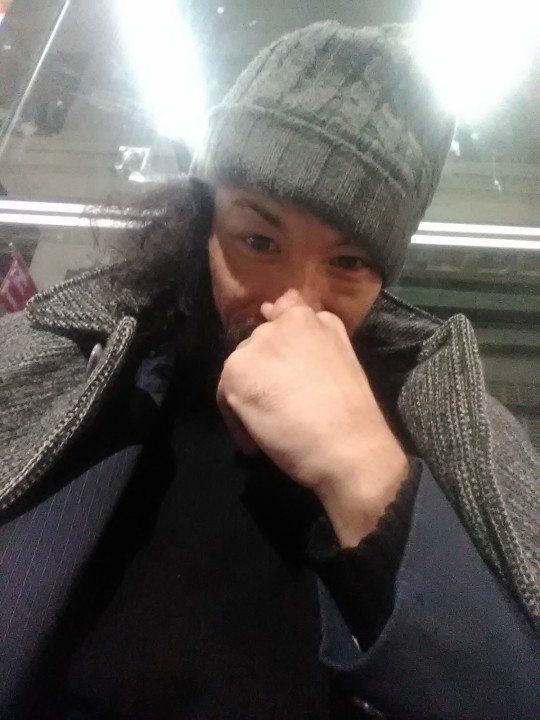
#nfl news#national football league#united nations#NATIONAL BACHELORS ASSOCIATION#NATIONAL BUSINESS ASSOCIATION#national football conference#NFC563-1463#pythagorean numerology#baltimore ravens#carolina panthers#san fransisco 49ers#pittsburgh steelers#national and international news#NATIONAL AND INTERNATIONAL SPORTS ASSOCIATION
8 notes
·
View notes
Text
How Will a College Experience Affect Your Life?
Will college really make your wildest dreams come true? Or is it the individual's discipline?
#College #BachelorsDegree #AssociatesDegree #HigherEducation #College Experience
What do you really expect to get out of a college experience? Do you really need college to be successful?
It’s pretty strange that even though there is so much information about student debt and how bad colleges can be, college is still in the forefront of many young adult lives. It’s quite a shame that many kids look forward to the college experience without even realizing they can get a…

View On WordPress
#associates degree#bachelor&039;s degree#College#college experience#Education#Florida National University#unemployment
6 notes
·
View notes
Text
THIS DAY IN GAY HISTORY
based on: The White Crane Institute's 'Gay Wisdom', Gay Birthdays, Gay For Today, Famous GLBT, glbt-Gay Encylopedia, Today in Gay History, Wikipedia, and more … FEBRUARY 24


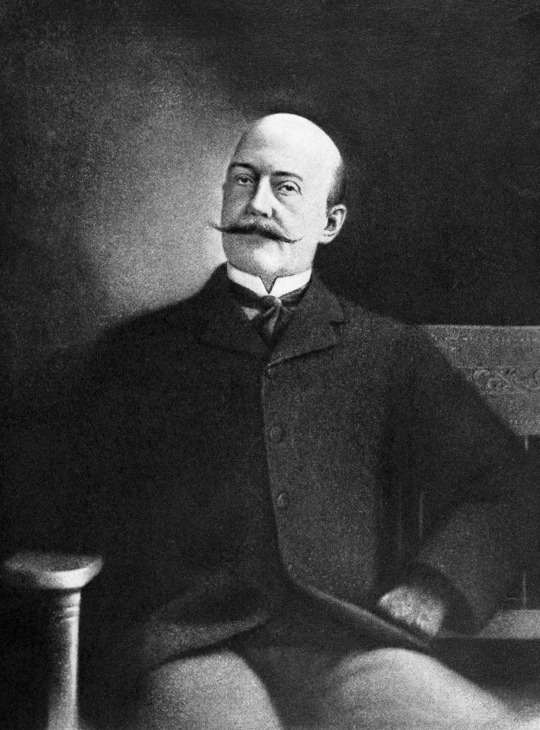
1836 – Winslow Homer (d.1910) was an American landscape painter and printmaker, best known for his marine subjects. One of the most prolific and important American painters and printmakers of the second half of the nineteenth century, Winslow Homer created a distinctly American, modern classical style.
Homer dealt with many of the same themes that writers such as Henry Thoreau, Herman Melville, and Walt Whitman did, including the heroism displayed by ordinary individuals, when confronted by seemingly insuperable difficulties; the camaraderie and friendships enjoyed by soldiers and working men; and the isolation of the individual in the face of the "Other."
Born in Boston on February 24, 1836, Homer was initially trained as an artist by his mother, Henrietta Benson Winslow, who successfully exhibited watercolors of flowers and other still life subjects throughout her adult life.
Between 1855 and 1857, he was apprenticed to John H. Bufford, a nationally prominent commercial artist, based in Boston; with this training, he began to do free-lance work for Harper's Weekly and other magazines.
In 1861, Homer was commissioned by Harper's Weekly as a special artist/correspondent to record the events of the Civil War. Homer failed to produce the heroic battle scenes that his editors had wanted. Yet his images of the daily lives of ordinary soldiers greatly appealed to the magazine's readers and helped to establish his reputation.
Among other subjects, he represented guard duty (A Sharp-Shooter on Picket Duty, wood engraving, 1867); punishments for minor infractions (A Punishment for Intoxication, painting, 1863); medical care for the wounded (The Surgeon at Work at the Rear During an Engagement, wood engraving, 1862); and recreation (Soldier Dancing, drawing, 1862).

The Empty Sleeve at Newport
As the war ended, Homer revealed the personal "costs" of the conflict in such images as The Empty Sleeve at Newport (wood engraving, 1865), which represents a one-armed man, riding in a carriage with a sad, aloof well-dressed woman.
Very little is known about Homer's "private" life. He consistently refused to answer personal questions from critics and potential biographers, and he left no revealing diaries or other personal papers. His reclusiveness is indicated by the fact that he produced no self-portraits; in contrast, most American and European painters of the nineteenth century eagerly exploited the rapidly growing market for images of artists.
Most historians have adamantly maintained that Homer remained a bachelor because he was extraordinarily "shy" around women. However, it would seem more plausible to suggest that Homer simply may not have been interested in women sexually.
Constructing Homer as a solitary eccentric, who virtually withdrew from human society, most scholars have overlooked evidence of significant, intimate associations with other men.
One of his closest friends was Albert Kelsey, a fellow artist whom he initially met in 1858 in Massachusetts. In 1867, Kelsey traveled with Homer to Paris, where they lived together for the next two years.
A studio photograph, made while they were in Paris, mimics the conventions of marriage portraits, as do so many photographic portraits of male friends of this period. Kelsey inscribed the back of the photograph with the names "Damon and Pythias," famous ancient Greek heroes and lovers.In the 1890s, Homer remembered their friendship in the humorous and erotically suggestive drawing "Albert Kelsey riding a giant turtle in the Bahamas."
Homer's closest companion in the final years of his life was an African-American man, Lewis Wright, who worked as his servant and lived at his Prout's Neck, Maine estate from 1895 to 1910. There are indications that some of Homer's acquaintances were disconcerted by the apparent closeness of his friendship with Wright. While most "negative" reactions involved race, other "unmentionable" factors may also have been involved.
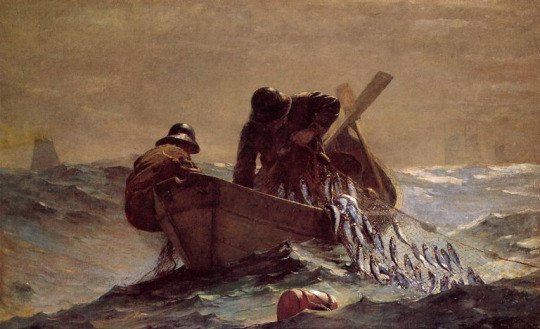
The Herring Net
Throughout his career, Homer created images that celebrated diverse aspects of male friendships. Thus, he depicted soldiers, unified in melancholy longing for peacetime home life (Home, Sweet Home, 1863); wilderness guides enjoying the beauties of nature (Two Guides, 1871); and fishermen laboring together (The Herring Net, 1885) and coping with dangerous storms (The Signal of Distress, 1890).
Homer died on September 29, 1910 in Prout's Neck, Maine.

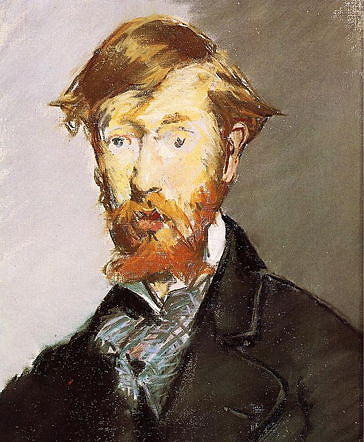
1852 – The Irish novelist, short-story writer, poet, art critic, memoirist and dramatist, George Moore was born on this date (d.1933). Moore came from a Roman Catholic landed family. He originally wanted to be a painter, and studied art in Paris during the 1870s. There, he befriended many of the leading French artists and writers of the day.
As a naturalistic writer, he was amongst the first English-language authors to absorb the lessons of the French realists, and was particularly influenced by the works of Émile Zola. His writings influenced James Joyce, according to the literary critic and biographer Richard Ellmann, and, although Moore's work is sometimes seen as outside the mainstream of both Irish and British literature, he is as often regarded as the first great modern Irish novelist.
According to Brian Lacey's new book, Queer Creatures: A History of Homosexuality in Ireland, Moore outed his good friend, the artist Edward Martyn, in his three-volume masterpiece Hail and Farewell (published between 1911 and 1914). Moore, who was attracted to the handsome young Yeats, later fell in love with the celebrated French painter Edouard Manet, who painted three portraits of him. Moore was influenced by the homosexual Oxford critic Walter Pater, and Moore's 1879 work, "Flowers of Passion," already contained references to Lesbianism. Moore's 1887 novel, A Mere Accident, also has a homosexual theme and its central character is again based on Martyn.

1868 – The first parade to have floats is staged at Mardi Gras in New Orleans, Louisiana.

1938 – A California appellate court upholds an oral copulation conviction of a man in a hotel after naval investigators listened in and heard his bed squeaking.

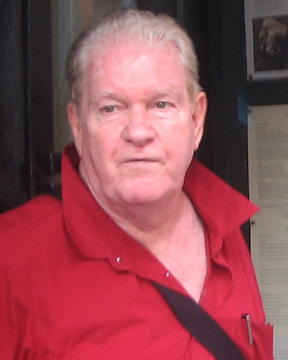
1939 – Doric Wilson (d.2011), the American playwright, was born on this date. Some people write for the "alternative" theatre because they aren't good enough for Broadway. Doric Wilson wrote for it because he was too good for the Great White Way.
Wilson was one of the first playwrights at NYC's legendary Caffe Cino, his comedy "And He Made A Her" opening there in 1961. Other Cino productions followed, including "Now She Dances!" (one-act version), "Babel Babel Little Tower " and "Pretty People" .
Street Theater, Wilson's best-known play, is a fictionalization of the Stonewall riots, an event in which Wilson took part. Using satire and exaggeration, Wilson recreates the milieu of street culture in Greenwich Village in the late 1960s, presenting characters variously described as "heavy leather, keys left," "a flower child," and "a street queen." The characters are archetypes representing both the disparate groups involved in the riot and also real people Wilson knew. A complex parody of Wilder's Our Town and Crowley's The Boys in the Band, the play is both deeply literary and deeply rooted in a particular time and place.
A veteran of the anti-war and civil rights demonstrations of the early 1960s-mid 1970s, Wilson was a participant in the Stonewall Riots. An active participant in the early gay liberation movement, Wilson was a member of the Gay Activists Alliance (GAA). He helped support himself as a bartender and manager of several bars and clubs that sprouted up in the wake of Stonewall, including such institutions as Spike, Ty's, and Brothers & Sisters Cabaret. Wilson's activism and his thorough immersion in New York's gay community are reflected significantly in his work.
In 1974, Wilson (with Billy Blackwell, Peter del Valle and John McSpadden) formed TOSOS (The Other Side of Silence), the first professional theatre company to deal openly and honestly with the gay experience. The company featured new plays and revivals by such writers as Brendan Behan, Noël Coward, Christopher Hampton, Charles Jurrist, Joe Orton, Terrence McNally, Robert Patrick, Sandra Scoppettone, Martin Sherman and Lanford Wilson. In June, 2001, Wilson, and directors Mark Finley and Barry Childs resurrected the company as TOSOS II. The original TOSOS and its production of Doric Wilson's play The West Street Gang are featured in "Perform", the new permanent exhibit on theatre at The Museum of New York City.
A pioneer in the Off-Off-Broadway movement, he was completely committed to alternative theater and over the past 25 years has written, directed and produced more than a hundred productions. Such plays as Forever After, A Perfect Relationship , and The West Side Gang made him not only "one of a handful of leading contemporary playwrights who deal frankly with the Gay experience," but a satirist of the first water whose targets - hypocrisy, cant, and simply human foibles - are universal.

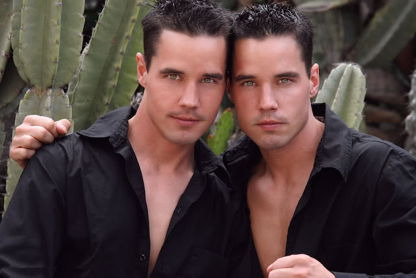
1975 – Gary Lane and Larry Lane, born in Goldsboro, N.C., are identical twin actors, models, film producers and screenwriters. They are both gay. The twins have appeared in feature films and national TV ads and are three-time grand prize champions of reality TV competitions. They are best known for a film they co-produced and appeared in, Hollywood to Dollywood, a feature-length documentary released theatrically in 2012. The film, about their quest to personally deliver a screenplay they've written to singer-actress Dolly Parton, played at 60 film festivals and won 24 festival awards.
Since the early 2000s, the Lane twins have appeared in feature films, TV programs, reality TV shows and TV commercials. As teenagers, they appeared on several episodes of Dawson's Creek and played twin colonial flag bearers in the Mel Gibson film The Patriot (2000). Other film appearances include Zoolander (2001), New Best Friend (2002), Spider-Man (2002), The Girl Next Door (2004), Eating Out 3: All You Can Eat (2009), and Jack and Jill (2011)
youtube
The Lane Twins talk of their life
The twins have competed on and won $50,000 on NBC's Fear Factor; beat out 24 other contestants for the grand prize of $50,000 on ABC's Winter Wipeout; and won $125,000 on the reality TV competition Set For Life. Gary Lane said their goal for appearing on these shows was to win money to pay for music rights and production costs associated with their documentary Hollywood to Dollywood. "For every wipeout, I would say, 'that was for Jolene, and for every ouch, 'that was for Coat of Many Colors!,'" Gary Lane said, referring to the need to raise money for licensing rights to hit Parton songs.
The Lane twins wrote a screenplay, Full Circle, which includes a role tailored for Dolly Parton. They submitted the script to Parton's management, but Parton's managers returned it as "unsolicited material." The twins decided to drive from Los Angeles, where they live, to Parton's theme park in Tennessee, Dollywood. The goal was to try and hand their script to Parton during one of her appearances at Dollywood's 25th anniversary celebration. In addition, the documentary explores the Lane twins' concerns about their Southern hometown's potential reaction to the film (and to the brothers' homosexuality) and their desire for acceptance from their Southern Baptist mother. Also on the journey is Gary's partner, Michael Bowen, who has crafted a birdhouse for Ms. Parton. The journey to deliver their screenplay is the focus of their documentary feature, Hollywood to Dollywood, which played at 60 film festivals throughout 2011 and 2012, winning 24 awards.
Parton makes an appearance in the film. After viewing the documentary, she gave the twins rights to use her music and likeness in its promotions. The Lane twins donate 10 percent of each Hollywood to Dollywood DVD sold to Parton's Imagination Library, an organization that provides free books to young children and is part of the Dollywood Foundation.

Today's Gay Wisdom:

George Moore
Faith goes out of the window when beauty comes in at the door. - George Moore
The mind petrifies if a circle be drawn around it, and it can hardly be denied that dogma draws a circle round the mind. - George Moore
A man travels the world over in search of what he needs and returns home to find it. - George Moore
A great artist is always before his time or behind it. - George Moore
I am filled with pride when I think of the noble and exalted world that must have existed before Christian doctrine caused men to look upon women with suspicion and bade them to think of angels instead. - George Moore
The world is dying of machinery; that is the great disease, that is the plague that will sweep away and destroy civilization; man will have to rise against it sooner or later. - George Moore
The difficulty in life is the choice.
- George Moore



26 notes
·
View notes
Text
Over the past two years, more than 20 states have expanded access to state jobs through a simple move: assessing or removing bachelor’s degree requirements. With state, local, and federal governments employing 15% of the U.S. workforce, these actions are of enormous consequence, especially for “STARs,” or workers who are skilled through alternative routes. STARs—who have gained their skills through community college, the military, partial college, certification programs, and, most commonly, on-the-job training—represent over half of the nation’s workforce, and currently occupy approximately 2 million state jobs.
Government leaders see removing bachelor’s degree requirements as critical to meeting their hiring needs and public service delivery obligations. And at a time when states are struggling to fill a high number of open roles, removing these requirements can attract a larger pool of talent.
Many states already have laws or policies that forbid discrimination based on educational attainment. But in practice, hiring patterns have favored degrees, and the composition of the state workforce reflects this. While they comprise half of the workforce, STARs fill only 36% of state jobs—representing a gap of 1 million good state jobs for STARs nationwide.1 The explicit commitment to removing degree requirements is a signal to STARs that they are welcome to apply.
Further, these actions are meant to build a state workforce that reflects the community it serves. Historically, government employment has been used to improve economic equity, providing increased economic opportunities for members of historically disadvantaged groups (notably women and Black workers). In recent decades, however, the bias toward credentialing has resulted in the inadvertent exclusion of STARs, with disproportionate consequences. When a bachelor’s degree is required for a position, employers automatically screen out almost 80% of Latino or Hispanic workers and nearly 70% of Black, veteran, and rural workers. Increased STAR hiring will help correct this inequity.
It is still too early to measure the impact of these changes on hiring behavior, as it will take time while hiring numbers slowly accumulate through job turnover and new positions. Yet we can already see signs that the effort is bearing fruit. In the first quarter of this year, more than 20 states made a yearlong commitment to focus on skills-based hiring through the National Governors Association’s Skills in the States Community of Practice. As one of the lead partners, our organization—Opportunity@Work—supports states through peer learning to prepare and make action plans for the organizational changes needed to implement skills-based practices, which will ultimately improve hiring and advancement outcomes for STARs.
We also see changes in state job postings. We analyzed two years of data on jobs that paid over the national median wage and were posted by all the states that took action to remove degree requirements by April 2023.2 Our findings show that in the 12 months prior to these state actions, 51.1% of roles explicitly listed a bachelor’s degree as a requirement. In the 12 months following, that percentage fell to 41.8%—a nearly 10-point shift. The largest shifts occurred in job postings for roles in management, IT, administration, and human resources—all occupations in which STARs have been underrepresented in the public sector compared to the private sector. For example, in state governments, 69% of general and operations managers hold a bachelor’s degree, while only 45% do in the private sector.3
State leaders view these actions as a critical first step. “We are creating opportunities for everyone, not just those with higher education,” said Melissa Walker of the Colorado Department of Personnel and Administration. “We want to draw on all kinds of experience.” Colorado has pragmatically focused on policy implementation and behavior change; in addition to updates to agency rules and regulations, its executive order focused on a transition to skills-based hiring as the norm for Colorado human resources, including funding for the training of hiring managers and development of a skills-based hiring toolkit. The state’s Department of Personnel and Administration is providing training and resources for human resources teams across state agencies, enabling each to make the necessary changes in their processes and procedures. Resources include a new job description template designed to identify skills—a simple tool that promotes skills-first thinking and behavior change at the hiring manager level.
Culture and systems change both take time. Adjusting common processes and procedures—as well as attitudes and behavior—is challenging, especially in a large, decentralized state government. Yet more than 20 states have begun this hard work. This month, bolstered by these early successes, Opportunity@Work is proud to launch the STARs Public Sector Hub to support these states and others on their skills-based journeys and build the public workforce to meet this moment.
14 notes
·
View notes
Text
Thomas Fountain Blue
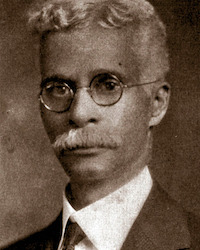
Thomas Fountain Blue, the first African American to head a public library in the United States, was also a civic, educational, and religious leader. Blue was born in Farmville, Virginia, on March 6, 1866, to Noah Blue, a carpenter, and Henry Ann Crawley Blue. They were parents of two other children, Alice Blue and Charles Blue.
Blue enrolled in Hampton Institute in Hampton, Virginia, in 1885 and graduated in 1888. In 1894, he enrolled in Richmond Theological Seminary (now Virginia Union University) in Richmond, Virginia, finishing in 1898 with a Bachelor of Divinity degree. One week later, when the United States declared war on Spain after the sinking of the USS Maine off the coast of Cuba, touching off the Spanish-American War, Blue joined the Sixth Virginia Volunteers battalion comprising African American soldiers and was stationed first in Camp Poland in Tennessee and later at Camp Haskell in Georgia.
In 1905, Blue was selected to lead the Western Branch Library of the Louisville Free Public Library on South 10th and Chestnut Street, the first Carnegie Library in the nation to serve African American patrons with an exclusively African American staff. The facility cost $31,024.31 to build and when completed had over 4,000 books and 53 periodicals.
In 1914, Blue opened Louisville’s second Carnegie Library for African Americans, the Eastern Branch Library. During World War I, Blue was drafted, left the branch, and was appointed the Education Secretary at Camp Zachary Taylor in Louisville, one of sixteen national Army training camps created across the nation. Blue worked with Black troops who mostly had supporting and laboring roles in the United States.
After the war ended in 1918, Blue returned to Louisville, and a year later, in 1919, he was named head of the “Colored Department” for the city’s public library system and supervised eight African American assistants. The Colored Department was the first in the United States to have a staff which served multiple Black library branches.
In 1922, Blue was a presenter at the American Library Association Conference in Detroit, Michigan, where he gave a paper titled, “Training Class at the Western Colored Branch,” and led the subsequent discussion with the Negro Roundtable composed of other African American Library staffers from across the nation.
On June 18, 1925, Blue married Cornelia Phillips Johnson from Columbia, Tennessee, and they parented two children, Thomas Fountain Blue, Jr., and Charles Blue (named after his younger brother). Two years later, in 1927, Blue founded the Negro Library Conference and conducted its first meeting at Hampton Institute.
Later becoming a minister, Reverend Thomas Fountain Blue—who held membership in the American Library Association, the Special Committee of Colored Ministers of Louisville on Matters Interracial, and was a charter member of the Louisville Chapter of the Association for the Study of Negro Life and History—died on November 10, 1935, in Louisville, Kentucky. He was 69.
At the 2003 joint conference of the American Library Association with the Canadian Library Association Annual Conference at the Metro Toronto Convention Centre in Toronto, Ontario, Blue was posthumously honored when the organization passed a resolution recognizing his leadership in promoting professionalism among the staff of African American libraries across the United States. In 2022, a headstone honoring Blue and his wife, Cornelia Phillips Johnson, was placed at Eastern Cemetery in Louisville by the Frazier History Museum.
https://www.blackpast.org/african-american-history/people-african-american-history/thomas-fountain-blue-1866-1935/
24 notes
·
View notes
Note
Hello! How are you?
I am reading about political parties during the Regency era and I have a question. Which of Austen's characters do you think are Whigs and which are Tories?
You really going to force me to relearn what Whigs and Tories were? Cruel, cruel nonnie. I'm going to cheat, this is from my favourite thesis on Jane Austen, Above the Vulgar Economy:
As Josephine Ross in Jane Austen: A Companion maintains,
The clear-cut distinctions of modern parliamentary politics had yet to emerge; and while the Whigs in the House of Commons tended to represent the interests of the aristocracy and upper classes, as well as expressing liberal ideals, the Tories – with their broad adherence to the more traditionally middle-class principles of upholding the Crown and keeping disaffection in check – were more identified with the landed gentry, and educated, but modestly situated, families such as the Austens.
At the time, the two party system was still evolving, and there was a great deal of dissention in the ranks. There were reactionaries, reformers and radical members in both parties. There were conservative, moderate and liberal Tories, and the Whig party was factionalized into Portland Whigs, Rockingham Whigs, Benthamites and Foxites to name a few.
Also, I have gotten the impression from reading other novels (eg. Wives & Daughters by Elizabeth Gaskell) from the time that often people knew which party their family voted for, but knew almost nothing else. Something that totally still happens today!
Here is another great passage:
In fact, when Pride & Prejudice was originally written as First Impressions in 1796 and 1797, Austen‟s novel appears to have been taking a stand in favor of two controversial economic proposals being debated in the House of Commons and in the press, a national minimum wage and Poor Law reform, thus Pride & Prejudice was
much more than a satire of manners but was also a political critique of Jane Austen's society. Both proposals were championed at the time by Tory Prime Minister William Pitt, the Younger and supported by liberal Tories and moderate Whigs. Both proposals were vehemently opposed by reactionary Tories and radical Whigs. The eligible bachelors in Pride & Prejudice are all associated with the Whig party, as is Lady Catherine de Bourgh, but the characters, like the Whigs in the House of Commons, have very different attitudes towards money and the working class.
Additionally, Austen's contemporaries would have known that Elizabeth Bennet's agricultural county, Hertfordshire, was, at least for the working class, the poorest county in England, just as Fitzwilliam Darcy's Derbyshire, financially stimulated by the Industrial Revolution, was the richest county, and Lady Catherine de Bourgh‟s Kent was a mixed county that varied enormously, from parish to parish, in prevailing wages and in treatment of the poor. The admirable Whig characters, like Fitzwilliam Darcy and Charles Bingley, are kindly and generous, while the radical Whig, Lady Catherine de Bourgh, is selfish and stingy, and George Wickham is simply an opportunist and a scoundrel. By its presentation of the different Whig characters, the text appears to be appealing to Whigs to be generous to the working class and encouraging Tories to look approvingly on those Whigs who are willing to financially support the poor.
Pride and Prejudice also includes a large number of characters who are servants, many identified by name. As most of them have no dialogue and do nothing to forward the plot, their presence in the novel at all may seem curious, but the depiction of the working class in Pride and Prejudice is more subtle to the modern reader than it would have been to Austen‟s original readers. The servants in Pride and Prejudice refute the assumptions of prominent Whig economists and politicians, Edmund Burke, Frederic Eden and Patrick Colquhoun, who depicted the lower class as ignorant, wasteful and immoral. Lady Catherine‟s financial neglect of the poor in Kent conforms to the economists‟ advice based on their assumptions that the working class was already adequately compensated for its labor and that poverty was the result of the irresponsible behavior of the poor. In stark contrast, Fitzwilliam Darcy‟s generosity to the poor in Derbyshire serves as a model response to poverty, and the general prosperity of Darcy‟s home county suggests that the solution to poverty is a combination of higher wages and liberal charity, exactly what the Prime Minister was proposing in 1797.
The general impression that I have gotten is that both Whigs and Tories were relatively ineffective. Anyway, a pretty clear answer for one character:
Pride and Prejudice‟s hero is almost certainly a Whig as well since the choice of the name, Fitzwilliam Darcy, is highly suggestive. Lord Fitzwilliam, later Earl Fitzwilliam, was from the north of England and, as historian William Hague describes him, one of the “Three great Earls of the Whig aristocracy”
Anywho, I'm not going to go through and sort them all since it seems fairly ambiguous who would be affiliated with which party. Also, almost everyone on earth holds some views that are extremely contradictory, so it's impossible to tell.
#question response#whigs vs. tories#someone with a better grasp on politics can answer this if they wish#I encourage everyone to read the extremely long thesis I'm quoting#It's amazing
26 notes
·
View notes
Text
Syringa Marshall-Burnett
youtube
Syringa Marshall-Burnett was born in 1935 in Saint Mary Parish, Jamaica. Marshall-Burnett was a leader in the nursing movement in her country, establishing its first post-RN bachelor's degree and serving as president of the Nursing Association of Jamaica. She was also a driving force in the creation of a regional nurse licensing exam for the Caribbean. In 1992, Marshall-Burnett was appointed to the Senate of Jamaica. In 1995, she became President of the Senate, a position she held until 2007. Marshall-Burnett remained in public life as an advocate for the elderly, and served as Chairperson of the National Council for Senior Citizens.
Syringa Marshall-Burnett died in 2014 at the age of 79.
#jamaica#nurses#caribbean#black women#afro caribbean#healthcare#women in healthcare#jamaican#Youtube
6 notes
·
View notes
Text

Stilinski & Associates by @ebjameston (wc148497, teen)
Summary:
“You want me to arrange a political marriage for your son?” Stiles repeats dumbly.
“It wouldn’t be the first time you’ve done this,” Talia Hale says, dark eyes twinkling over her impeccable blue pantsuit. “Senator Harvey and Elise’s match worked out perfectly, and they’re actually quite in love, from what I hear.”
“George Harvey was a little-known senatorial candidate from Kansas at the time, Madam President,” Stiles says slowly. “Your son – you, Mr. Hale,” he directs toward the man pacing tiny circles behind the president’s chair, “are the nation’s most eligible bachelor. Literally. I saw it on the cover of People.”
(Stiles is a political fixer. Derek is the president's son.)
This series. Holy wow. It's so well written - if it weren't TW characters it would sell as a fantastic political thriller. I literally couldn't put it down, all three parts were so great. So many levels, so much planning! A must read, seriously.
123 notes
·
View notes
Text
Stilinski & Associates by ebjameston
3 works | 148k total | complete
“You want me to arrange a political marriage for your son?” Stiles repeats dumbly.
“It wouldn’t be the first time you’ve done this,” Talia Hale says, dark eyes twinkling over her impeccable blue pantsuit. “Senator Harvey and Elise’s match worked out perfectly, and they’re actually quite in love, from what I hear.”
“George Harvey was a little-known senatorial candidate from Kansas at the time, Madam President,” Stiles says slowly. “Your son – you, Mr. Hale,” he directs toward the man pacing tiny circles behind the president’s chair, “are the nation’s most eligible bachelor. Literally. I saw it on the cover of People.”
(Stiles is a political fixer. Derek is the president's son. I've been watching too much Scandal.)
#Sterek#sterek fics#ao3 sterek#eternal sterek#derek x stiles#Derek Hale/Stiles Stilinski#derek hale#stiles stilinski#presidentialau#alivehalefamily#everyoneishuman#tobereadseries#JASFGrecs#sterek100k+
33 notes
·
View notes
Text

Nora Holt is best known as the first African woman to earn a master’s in the United States, but that distinction alone does little to capture her full life. Holt was also highly influential as a composer, singer and music critic.
Holt was born Lena Doulas in either 1895 or 1890 in Kansas City, Kansas. She attended the now-defunct HBCU Western University in 1917 with a bachelor’s degree in music. The following year, Holt earned her history-making degree from the Chicago Musical College. According to accounts, Holt was married three times before she earned her master’s.
The start of Holt’s writing career came in 1917 when the Chicago Defender hired her for a four-year stint. During her time at the paper, Holt penned an article focused on advocating for African musicians and in 1919, she co-founded the National Association of Negro Musicians.
Holt’s reputation as a socialite made her a larger than life character and kept her name alive in the gossip columns. After marrying wealthy Chicago hotel owner George Holt, Holt changed her named to Nora. After Mr. Holt died, she inherited his fortune and traveled the world, while reportedly taking on various lovers and composing some 200 original works.
After her fifth marriage dissolved, Holt resettled in Los Angeles as a music teacher, then returned to New York to work as the Amsterdam News’ first music critic. In 1945, she became the first African member of the Music Critics Circle of New York and worked as a producer and director for the “Concert Showcase” radio show on WLIB.
#african#afrakan#kemetic dreams#africans#brownskin#afrakans#brown skin#nora holt#chicago#holt#producer#radio show#masters
17 notes
·
View notes
Text
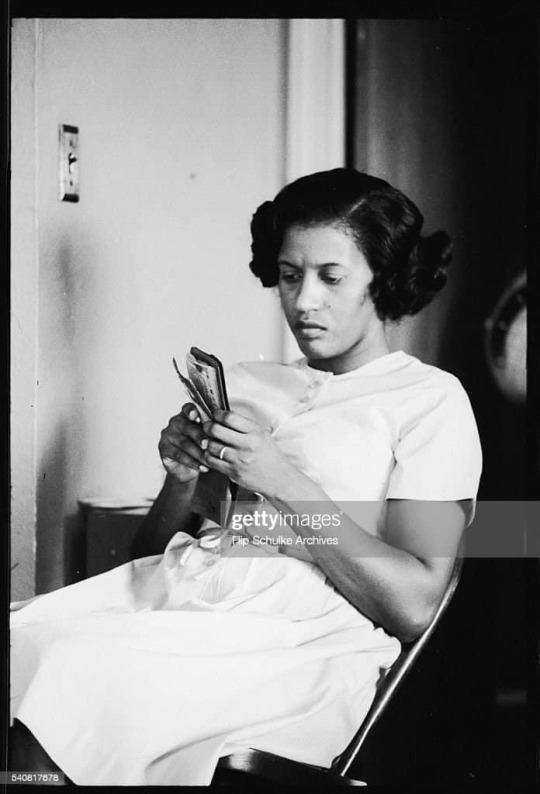

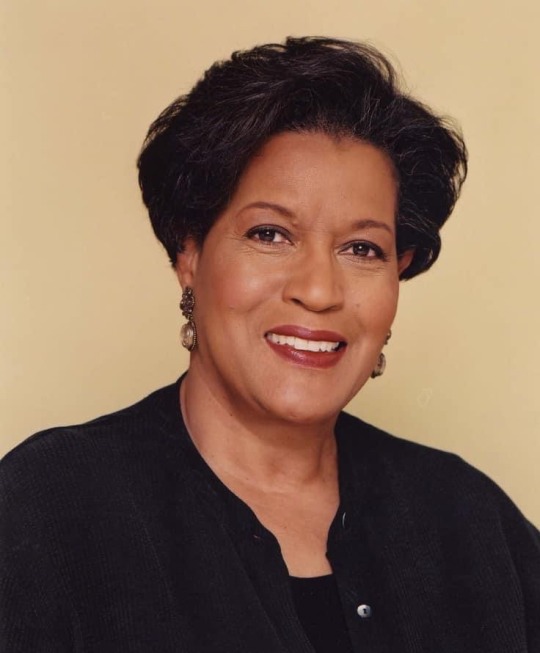
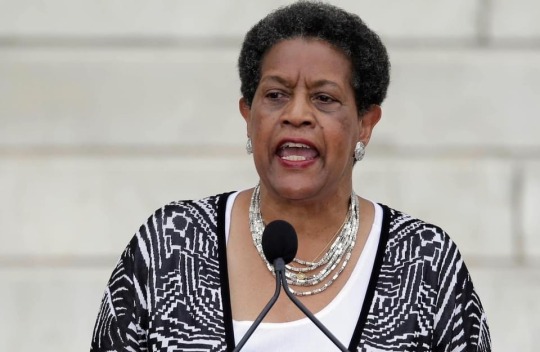

Black History Facts!!!
#Happy90th
#NAACP
Born Myrlie Louise Beasley on March 17, 1933, in her maternal grandmother’s home in Vicksburg, Mississippi. She was the daughter of James Van Dyke Beasley, a delivery man, and Mildred Washington Beasley, who was 16 years old. Myrlie’s parents separated when she was just a year old; her mother left Vicksburg but decided that Myrlie was too young to travel with her. Since her maternal grandmother worked all day in service, with no time to raise a child, Myrlie was raised by her paternal grandmother, Annie McCain Beasley, and an aunt, Myrlie Beasley Polk. Both women were respected school teachers and they inspired her to follow in their footsteps. Myrlie attended the Magnolia school, took piano lessons, and performed songs, piano pieces or recited poetry at school, in church, and at local clubs.
Myrlie graduated from Magnolia High School (Bowman High School) in 1950. During her years in high school, Myrlie was also a member of the Chansonettes, a girls’ vocal group from Mount Heroden Baptist Church in Vicksburg. In 1950, Myrlie enrolled at Alcorn A&M College, one of the few colleges in the state that accepted African American students, as an education major intending to minor in music. Myrlie is also a member of Delta Sigma Theta sorority. On her first day of school Myrlie met and fell in love with Medgar Evers, a World War II veteran eight years her senior. The meeting changed her college plans, and the couple later married on Christmas Eve of 1951. They later moved to Mound Bayou, and had three children, Darrell Kenyatta, Reena Denise, and James Van Dyke. In Mound Bayou, Myrlie worked as a secretary at the Magnolia Mutual Life Insurance Company.
When Medgar Evers became the Mississippi field secretary for the National Association for the Advancement of Colored People (NAACP) in 1954, Myrlie worked alongside him. Myrlie became his secretary and together they organized voter registration drives and civil rights demonstrations. She assisted him as he struggled to end the practice of racial segregation in schools and other public facilities and as he campaigned for voting rights many African Americans were denied this right in the South. For more than a decade, the Everses fought for voting rights, equal access to public accommodations, the desegregation of the University of Mississippi, and for equal rights in general for Mississippi's African American population. As prominent civil rights leaders in Mississippi, the Everses became high-profile targets for pro-segregationist violence and terrorism.
In 1962, their home in Jackson, Mississippi, was firebombed in reaction to an organized boycott of downtown Jackson’s white merchants. The family had been threatened, and Evers targeted by the Ku Klux Klan.
In 1967, after Byron De La Beckwith's release in 1965, she moved with her children to Claremont, California, and emerged as a civil rights activist in her own right. She earned her Bachelor of Arts in sociology from Pomona College. She spoke on behalf of the NAACP and in 1967 she co-wrote For Us, the Living, which chronicled her late husband's life and work. She also made two unsuccessful bids for U.S. Congress. From 1968 to 1970, Evers was the director of planning at the center for Educational Opportunity for the Claremont Colleges.
From 1973 to 1975, Evers was the vice-president for advertising and publicity at the New York-based advertising firm, Seligman and Lapz. In 1975, she moved to Los Angeles to become the national director for community affairs for the Atlantic Richfield Company (ARCO). At ARCO she was responsible for developing and managing all the corporate programs. This included overseeing funding for community projects, outreach programs, public and private partnership programs and staff development. She helped secure money for many organizations such as the National Woman’s Educational Fund, and worked with a group that provided meals to the poor and homeless.
Myrlie Evers-Williams continued to explore ways to serve her community and to work with the NAACP. Los Angeles mayor Tom Bradley appointed her to the Board of Public Works as a commissioner in 1987. Evers-Williams was the first black woman to serve as a commissioner on the board, a position she held for 8 years. Evers-Williams also joined the board of the NAACP. By the mid-1990s, the prestigious organization was going through a difficult period marked by scandal and economic problems. Evers-Williams decided that the best way to help the organization was to run for chairperson of the board of directors. She won the position in 1995, just after her second husband’s death due to prostate cancer. As chairperson of the NAACP, Evers-Williams worked to restore the tarnished image of the organization. She also helped improve its financial status, raising enough funds to eliminate its debt. Evers-Williams received many honors for her work, including being named Woman of the Year by Ms. Magazine. With the organization financially stable, she decided to not seek re-election as chairperson in 1998. In that same year, she was awarded the NAACP's Spingarn Medal.
Sources:
Padgett, John. "MWP: Myrlie Evers-Williams". University of Mississippi. Retrieved October 20, 2011
Goldsworthy, Joan. "Gale - Free Resources - Black History - Biographies - Myrlie Evers-Williams". Gale. Retrieved November 22, 2011.
Myrlie Evers-Williams Biography - Facts, Birthday, Life Story - Biography.com". Famous Biographies & TV Shows - Biography.com. A&E Television Networks. Retrieved November 22, 2011.
Davis, Merlene. "Merlene Davis: Myrlie Evers-Williams doesn't want us to forget". Kentucky.com. Retrieved November 22, 2011.
Jessie Carney Smith; VNR Verlag für die Deutsche Wirtschaft (1996). Notable Black American Women: book II. p. 208.
University of Virginia (June 24, 2013). "Speakers and Guests Bios". virginia.edu. Archived from the original on June 2, 2013.
28 notes
·
View notes
Text
Here's Why You Shouldn't Give Me A Scholarship
You shouldn’t give me a scholarship because I have withdrawn from three courses so far in my college career. Because I chose to take seven dual-enrollment courses instead of eight in high school. Because I have severe imposter syndrome within my chosen major. Because I already have a 40,000 scholarship. Because my parents work hard and make good choices with their money. Because I am white. Because I am not going into healthcare or music, engineering, coding, or even dance. I don’t deserve a scholarship because I procrastinate and then have missing assignments and because my room is messy.
I could think of a million more reasons why you shouldn't give me a scholarship. I don’t set aside time for assignments, I do not apply often to scholarships or internships. I am not in more than two clubs on campus. But I am a summer camp counselor. I have been for five years. I pick up shifts at Steam Anchor Coffee Co. where I work. I have always picked up extra shifts. And it has never been for money. It is because I liked my job. I like working with kids. I like to write, but not when someone else tells me what to write, where I can take evidence from, how long the piece has to be, and when I have to have it complete. I like to learn, but when I find things interesting.
I am more in the Chemistry Teacher Education major for teaching than chemistry. And as I have said, ‘if not me then who?’ If I don’t pick up this shift and help someone else out, then who will. Because the group chats are most often silent. The National Science Foundation created a nation-wide scholarship for university juniors and seniors studying to become teachers in the STEM subjects. At my school there are 3 math majors, 2 bio, and 1 chem. Me. There are no physics teachers. I was not even a junior when I received my scholarship. I was a sophomore with junior hours thanks to the 7 dual-enrollment courses in high school.
My mom is going to be so mad at me because I had to withdraw from both of my summer classes. I did not make a lick of time for either of them in the first week. And, well, it set me up for failure. Late work gets zero’s in the gradebook so I would have an ‘F’. But instead I choose ‘W’. I have withdrawn from a class before. I withdrew from a psychology course my second semester of freshman year at Clinton Community College. I was registered for 5, 16-week classes and I looked at the workload after syllabus week and said, “Nope.” I got 100% tuition reimbursement though since I withdrew during the first week.
This is starting to sound like a sob-story and I hate it.
I am thinking of completely leaving college altogether. But I do not want to be considered a drop-out. I want to get a degree in something since I am already here. But, when I come home for summer I am blinded with the amount of people that go straight into the workforce or military after high school. Or they stopped after receiving an associate’s or a certificate or license. I am not sure I am cut out for the length of time it will take me to finish my bachelor’s in Chemistry Teacher Education (especially since I withdrew from two classes this summer).
I really liked geology, but I am not sure I liked it enough to do a whole major in it. I have said this about concerts as well. I like Taylor Swift, but I’m not sure I like her enough to go sit through 3 hours of her.
Am I screwed? No one is going to give a summer job to someone wanting to start in mid-June and leaving and mid-August. No one is going to give a scholarship to someone who would rather see a ‘W’ on her college record than an ‘F’. No one is going to give a scholarship to someone who procrastinates so bad she just doesn’t do her assignments. No one is going to give a scholarship to a hypocrite.
2 notes
·
View notes
Photo

Bible Conference in 1968 was strange:
The annual Spring Bible Conference is one of the outstanding features of the year at Bob Jones University. Running for eight days, the conference brings to the campus outstanding, orthodox Bible teachers, pastors and evangelists. All regular academic work is suspended for the conference which takes the place of a spring vacation.
This year's conference was considered one of the school's best. More off-campus guests were present than for any other event in the school's history.
Services were held in the 3,000-seat Rodeheaver Auditorium, and overflow crowds watched the services via closed-circuit television in the 1,000-seat Concert Center. For most of the sessions it was necessary to use a third auditorium the War Memorial Chapel, which has a seating capacity of about 700+.
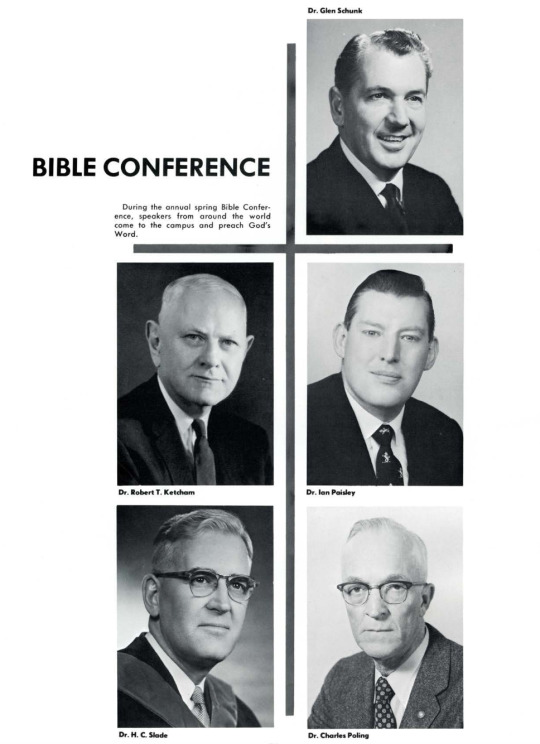
Guest speakers at the conference included Dr. Robert T. Ketcham, national consultant (retired), General Association of Regular Baptist Churches, Chicago, Ill.; Dr. Ian R. K. Paisley, pastor of Raven hill Free Presbyterian Church, Belfast, Ireland, moderator of Free Presbyterian Church of Ulster, editor of "The Revivalist," "Protestant Telegraph." Also, Dr. Charles S. Poling, pastor of the Church of All Christian Faiths, Phoenix, Ariz.; Dr. Glen Schunk of Greenville, evangelist; and Dr. H. C. Slade, pastor of Jarvis Street Baptist Church, Toronto, Canada.
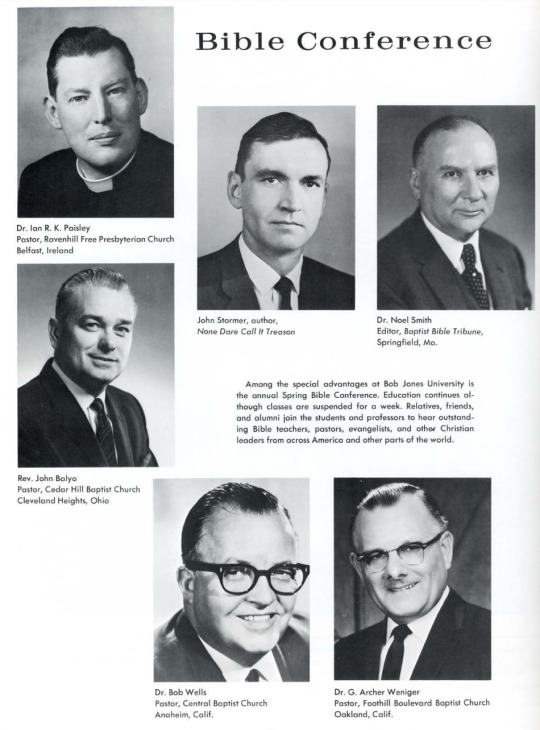
The next Bible Conference will be March 30-April 7, 1968. Among the speakers scheduled are Dr. G. Archer Weniger, pastor of the Foothill Boulevard Baptist Church of Oakland, Calif; Dr. Noel Smith, editor of the Baptist Bible Tribune," Springfield, Mo.; Dr. Bob Wells, pastor of the Central Baptist Church of Anaheim, Calif.; Rev. John Balyo, pastor of the Cedar Hill Baptist Church of Cleveland Heights, Ohio; and John Stormer, author of' "None Dare Call It Treason."
John Stormer was an anti-communist speaker.
And then a WBJU story:
WBJU, the student-manned carrier-current radio station, is now in its second year of operation. Located in the radio television wing of the Fine Arts Building, the fully equipped radio station is designed to be heard in the eight student dormitories.
Though staffed entirely by radio students, the station's operations are supervised by Robert Pratt, chairman of the division of speech and head of the department of radio and television, and other members of the radio-television faculty.
According to Mr. Pratt, the carrier-current station serves as a "laboratory training unit for students who have dedicated themselves to using broadcasting as a Christian ministry." He said that the station also endeavors to supplement the listening interests of the student body.
The university grants the bachelor of arts degree in radio and television and the bachelor of science degree in broadcast engineering. WBJU is in addition to the commercial stations operated by Bob Jones University -- WMUU and WMUU-FM in Greenville and WAVO and WAVO-FM in the Atlanta, Ga., area.
#Bob Jones University#1967#Greenville News#YeahTHATGreenville#Advertisement#Anniversary#Bible Conference#BJUBC1968#WBJU#WAVO#WMUU
2 notes
·
View notes
Note
I love my job and especially because it can be more complicated than blood type and it's like figuring out a logic puzzle to get compatible blood for some patients. The official name of our profession is "immunohematology" which is the study of the immune system of the blood and it's really cool!
There's a huge shortage of lab scientists, so if anyone is thinking about the medical field but not sure about patient care look into lab. We learn about a lot of diseases and how they show up in lab work. There are two certification levels, associate's and bachelor's. We are required to pass national board exams and recertify with continuing ed every 3 years.
I've been the person to see blasts in a 2 year old's blood sample and know they have leukemia, the pathologist officially calls it but the lab is the first to know what's going on with a patient. There are different areas like chemistry is electrolytes, hormones, and things like that then there's hematology which is your complete blood counts and white cell differentials, coagulation which all about how the blood is clotting, urinalysis for urine testing, microbiology for infectious disease testing and identification, and blood banking for transfusions. Those are the main areas but there are so many other subspecialties.
I've been at a blood center for the past almost decade but am looking to get back into the hospital setting. I'm actually hoping to interview soon for a lab director position.
You're the coolest person ever
#and i wish you best of luck on your future interview! but you sound like you got it in the bag#thanks for sharing i just think this shit is so interesting lol. i love the lab in my hospital i never know what they're#talking about most times but they give me candy and let me hang around and ask questions 😂#kitkat answers asks
3 notes
·
View notes
Text
Constantin Nikolaj Vladimir Rakeovich III

No one is quite sure where, or exactly when Constantin Nikolaj Vladimir Rakeovich was born. There are no records in the state of Illinois for his birth and some say there are none in the entirety of the United States. His grandfather came to this country at the end of World War II as part of a Top Secret program, the details of which are still sealed. No one is quite sure that the name that Constantin bears is even the real name of his grandfather. No records exist of a man with such a name in the Ukraine or in Russia, the two places that the family was supposedly from. In fact, the first mention of the name at all was in the employment records of the Argonne National Laboratory in 1948.
Secrets seem to surround every aspect of the Rakeovich family. Property records for them often have different names on them, all tracing back to one of the two surviving Constantin Rakeovichs. Out of deference to his father, the younger is referred to as Nikolaj by his family, however anyone not related to him that were to call him that would find themselves dispatched quickly. Few even know his middle names, more layers of secrecy on a family that officially seems not to exist.
While his grandfather appears to have been in some kind of research at Argonne, there are few records on what exactly his father did, but it was clear he was amassing great wealth. There are no less than five homes in the greater Chicago area that can be traced to the elder Constantin. There are rumors that he is the sole founder and owner of NVR Enterprises, a secretive company that is steeped in government contracts and foreign relations. Records on the company are hard to come by and those that look into its business dealings find themselves quickly warned off.
There are no school records readily available for the younger Constantin until he is found at the Houghton Academy in New York as a Freshman. He graduated with a straight A average and those who attended with him found him to be cold, aloof, and intimidating. While he was never physically violent, his classmates said that few were ever brave enough to outright challenge him. From Houghton, he moved on to Harvard where he got his Bachelor’s and then Master’s Degrees in Business and Finance. When he moved back to Chicago after graduation, he was brought in as CEO of NVR. To those around the Rakeovich family, this solidified the belief that the family owned the company. What exactly they do still remains shrouded in mystery.
Constantin proved himself to be shrewd and cutthroat in business, negotiating hostile takeovers of small, independent labs and then bringing them under NVR’s umbrella and tying them to Argonne. As soon as this would happen, all public releases of information became significantly more vague and the dealings of the company more clandestine. There are those who believe that the businesses and the family are in black ops, while others believe that they are all a front for a powerful Eastern European Crime family. With the secretive nature of the entire Rakeovich family and their associates, the odds seem evenly split between the two.
While Constantin continues to run NVR, he is known to deal in underworld matters as well. He first came onto the DEA and US Marshals radar a decade ago when it was found that at least one of his subsidiaries was being used to traffic in cocaine and other high end, designer drugs. Later ties to very high end escorts, extortion, loan sharking, and a protection racket would be uncovered, but Constantin has managed to stay one step ahead of law enforcement at every turn. Some say he is just that cunning, others say it is that he has bought off the Chicago offices of the DEA, FBI, and the US Marshals, then there are those who believe it is a combination of both.
Those who have crossed Constantin through the years have paid a high price, normally their lives. Anyone that he feels has betrayed him in any way has been eliminated. Many of these were very elaborately staged assassinations that were made to look like accidents. He has paid top dollar for the best in the business, including Sasha Vasiliev, to ensure that none of the deaths can ever be traced back to him. In recent years he has become a bit more hesitant to use Sasha, fearing that crossing the assassin would prove more fatal that if someone were to cross he himself. He has seen the assassin put a bullet through the skull of a man completely undetected to anyone around the target till he fell dead at their feet. Had he not been the one that hired Sasha, he never would have known who or how. That he does means that the assassin is one of the very few that Constantin would never double cross.
When the Federal, State, and Chicago law enforcement agencies began to close in on him, Constantin blamed one man: Colin Masterson. They have become bitter adversaries and while Colin would do whatever it took legally to bring down Constantin’s empire; Constantin does not relegate himself to legal means to try and take down Colin. The feud is escalating, each man pushing the other closer and closer to an explosive confrontation.
In kidnapping Colin’s intern, Constantin had hoped to force the man’s hand into dropping all investigations into his dealings. However the intern proved more stubborn and resistant to cooperation than Constantin had anticipated, bringing forth his anger in explosive bursts that even his longest known associates find hard to believe. Has Colin pushed him finally into the pit of madness from which there is no redemption, or is there still some vestige of humanity left in Constantin’s dark and murky soul? The man isn’t even sure himself.
#bending the law#my writing#original writing#bio#Constantin Rakeovich#my oc#writing#fiction#original fiction#original story
9 notes
·
View notes
Link
3 notes
·
View notes